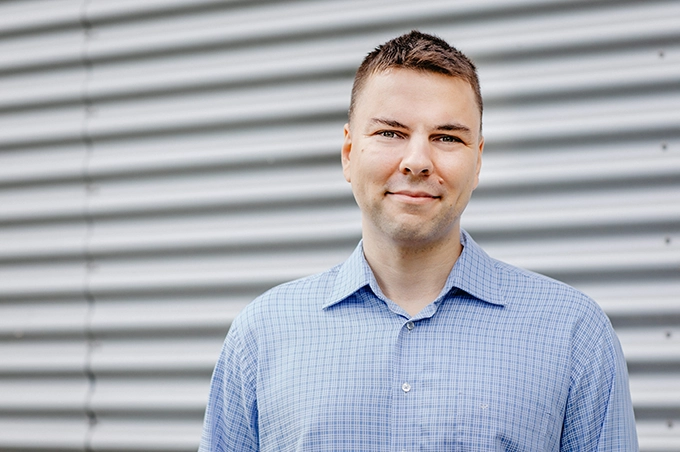About us

Prof Dr Henrik Daub
CSO
Henrik is a pioneer and scientific leader in the field of proteomics-based drug discovery with over 20 years of industry experience commercializing cutting-edge proteomics technologies. Henrik joined NEOsphere Biotechnologies from Evotec, where he served as Senior Vice President Science & Technology. In that role, he developed high-throughput, deep proteomics on automated, industrial-scale platforms and led global target discovery efforts for targeted protein degradation. Prior to that, Henrik was a group leader at the Max Planck Institute of Biochemistry and scientific founder of the proteomics company Kinaxo Biotechnologies. Henrik has a PhD in biochemistry from the Max Planck Institute of Biochemistry and received his venia legendi from the Technical University of Munich, where he is also Professor of Biochemistry.

Dr Jutta Fritz, MBA
CBO
Jutta is an internationally accomplished expert in business development and strategic partnering within the life sciences and diagnostics industries. Her strong track record builds on nearly 15 years of management experience steering the organizational growth and long-term collaborations with pharmaceutical partners to successfully commercialize technologies. Prior to joining NEOsphere Biotechnologies, she was co-founder and CBO of the cancer diagnostics company NEO New Oncology (sold to Siemens Healthcare in 2016), VP Business Development for Proteomics Services at Evotec, and Head of Business Development at the proteomics company Kinaxo Biotechnologies (sold to Evotec in 2011). Jutta has a PhD in molecular biology from the University of Vienna and an MBA in financial management from the University of Wales.

Tanja Schuster
Managing Director
Tanja is a business economist and expert in strategic and analytical business management. Her expertise builds on 15 years of management experience in international corporations such as Siemens and Nokia in the areas of strategic sourcing, global project management and consulting including financial management. In addition, she brings practical knowledge in the field of business start-up. Tanja holds a Diploma in Business Administration from the University of Applied Sciences in Munich, a degree from IPAG Business School in Nice and a Managing Director Certificate.

Dr Martin Steger
Head of Degrader Biochemistry
Martin has pioneered various state-of-the-art proteomics methods to validate target candidates of protein degraders. Those methods include the hypersensitive detection of degrader-induced ubiquitination events on neosubstrates using data-independent acquisition mass spectrometry (DIA-MS). Today, Martin spearheads the development of NEOsphere Biotechnologies’ high-throughput MS-based platforms. Martin has over 10 years of research experience. He worked on targeted protein degradation as a senior research scientist at Evotec and on MS-based proteomics with Prof. Matthias Mann at the Max Planck Institute of Biochemistry, where he discovered the first molecular marker for LRRK2, a gene often mutated in hereditary Parkinson's disease. Martin obtained his PhD in molecular cancer research from the University of Zurich.

Dr Uli Ohmayer
Head of Mass Spectrometry
Uli is a leading expert in industrial-scale, deep proteomic screening. He has over a decade of experience in mass spectrometry (MS)-based proteomics and broad expertise in laboratory automation and rapid scaling of proteomics infrastructure. Previously at Evotec, he was instrumental in the development of data-independent acquisition MS for single-shot proteomics with unprecedented throughput, depth, and sensitivity. Uli has a PhD in biochemistry from the University of Regensburg and was a postdoctoral researcher in the Mass Spectrometry Core Unit of Helmholtz Zentrum Munich.

Dr Björn Schwalb
Head of Biostatistics
Björn has been an expert in computational data analysis, statistical modelling, and data visualization for over a decade. In his previous position at Evotec, he developed complex software ecosystems to automate all aspects of handling, processing, and analyzing mass spectrometry data. Before that, he was a project leader in Computational Biology at the Max Planck Institute for Biophysical Chemistry, where he designed and evaluated high-throughput transcriptomics data analyses on high-performance computing clusters. Björn is a trained mathematician with a PhD in computational biology from the Ludwig-Maximilians-University in Munich and a degree in machine learning from Stanford University.

Dr Andreas Jenne
Andreas is a serial entrepreneur with more than 20 years of leadership experience in the life sciences industry. He has founded six biotechnology companies to date. Among other appointments, Andreas has served as managing director of SciRhom, RSP Systems, Kinaxo Biotechnologies (sold to Evotec in 2011), and NEO New Oncology (sold to Siemens Healthcare in 2016). He is also an active board member of several biotechnology companies and CEO of Ventura BioMed Investors GmbH, a venture capital investor in early-stage biotechnology companies developing breakthrough technologies and innovative therapies. Andreas holds a PhD in chemistry from Ludwig-Maximilians-University in Munich.

Dr Thilo Schröder
Thilo is Managing Partner at Nextech Invest, a Zurich-based global venture capital firm focused on oncology therapeutics and driving value creation for its portfolio companies. As an expert in precision oncology medicines and best-in-class targeted therapies, he serves on the board of numerous companies, including Revolution Medicines, PMV Pharma, Circle Pharma, Atavistik Bio, MOMA Therapeutics, Silverback Therapeutics, Exo Therapeutics, and Alterome Therapeutics and was a prior board member at Blueprint Medicines and Peloton Therapeutics. Thilo began his career at the pioneering cancer immunology company Micromet (acquired by Amgen). He has a Master’s degree from the University of Strasbourg and a PhD from the University of Zurich.

Dr/MSU Vadim Demichev
Vadim is a research group leader at the Charité – Universitätsmedizin Berlin, focusing on developing innovative mass spectrometry methods and data analysis approaches for proteomics. He has been a pioneer in the field, introducing several new MS technologies such as Scanning SWATH, Slice-PASEF, and the multiplexed data-independent acquisition (DIA) proteomics platform, plexDIA. Vadim's work has been instrumental in establishing high-throughput proteomics methods using data-independent acquisition (DIA). He is also the developer of the widely used DIA-NN data processing software suite, which has become the gold standard tool for DIA proteomics.
Scientific excellence and technological leadership form the foundation of NEOsphere Biotechnologies’ unique platform and capabilities. Our extensive list of supporting publications in top-tier scientific journals exemplifies this, with over 25 articles in Nature and Cell Press alone<.
/ Thielert M, Itang EC, Ammar C, Rosenberger FA, Bludau I, Schweizer L, Nordmann TM, Skowronek P, Wahle M, Zheng WF, Zhou XX, Brunner AD, Richter S, Levesque MP, Theis FJ, Steger M, Mann M. Robust dimethyl-based multiplex-DIA doubles single-cell proteome depth via a reference channel. 2023strong> Sep 12;19(9):e11503. doi: 10.15252/msb.202211503. Article ->
/ Steger M, Karayel O, Demichev V. Ubiquitinomics: History, methods, and applications in basic research and drug discovery. Proteomics. 2022. Mar 30; e2200074. DOI:10.1002/pmic.202200074. Article ->
/ Steger M, Demichev V, Backman M, Ohmayer U, Ihmor P, Müller S, Ralser M, Daub H. Time-resolved in vivo ubiquitinome profiling by DIA-MS reveals USP7 targets on a proteome-wide scale. Nat Commun. 2021. Sep 13;12(1):5399. DOI: 10.1038/s41467-021-25454-1. Article ->
/ Takahashi M, Lio CJ, Campeau A, Steger M, Ay F, Mann M, Gonzalez DJ, Jain M, Sharma S. The tumor suppressor kinase DAPK3 drives tumor-intrinsic immunity through the STING-IFN-β pathway. Nat Immunol. 2021. Apr;22(4):485-496. DOI: 10.1038/s41590-021-00896-3. Article ->
/ Karayel O, Tonelli F, Virreira Winter S, Geyer PE, Fan Y, Sammler EM, Alessi DR, Steger M, Mann M. Accurate MS-based Rab10 Phosphorylation Stoichiometry Determination as Readout for LRRK2 Activity in Parkinson's Disease. Mol Cell Proteomics. 2020. 19(9), 1546–1560. DOI: 10.1074/mcp.RA120.002055. Article ->
/ Maier K, Gressel S, Cramer P, Schwalb P. Native molecule sequencing by nano-ID reveals synthesis and stability of RNA isoforms. Genome Research. 2020. 30: 1332-1344 DOI: 10.1101/gr.257857.119. Article ->
/ Jaeger MG, Schwalb B, Mackowiak SD, Velychko T, Hanzl A, Imrichova H, Brand M, Agerer B, Chorn S, Nabet B, Ferguson FM, Müller AC, Bergthaler A, Gray NS, Bradner JE, Bock C, Hnisz D, Cramer P, Winter GE. Selective Mediator dependence of cell-type-specifying transcription. Nature Genetics. 2020. Jul1;52(7):719–727. DOI: 10.1038/s41588-020-0635-0. Article ->
/ Steger M, Diez F, Dhekne HS, Lis P, Nirujogi RS, Karayel O, Tonelli F, Martinez TN, Lorentzen E, Pfeffer SR, Alessi DR, Mann M. Systematic proteomic analysis of LRRK2-mediated Rab GTPase phosphorylation establishes a connection to ciliogenesis. eLife. 2017. 6: e31012. DOI: 10.7554/eLife.31012. Article ->
/ Schwalb B, Michel M, Zacher B, Frühauf K, Demel C, Tresch A, Gagneur J, Cramer P. TT-seq maps the human transient transcriptome. Science. 2016. 3;352(6290):1225-8. DOI: 10.1126/science.aad9841. Article ->
/ Steger M, Tonelli F, Ito G, Davies P, Trost M, Vetter M, Wachter S, Lorentzen E, Duddy G, Wilson S, Baptista MA, Fiske BK, Fell MJ, Morrow JA, Reith AD, Alessi DR, Mann M. Phosphoproteomics reveals that Parkinson's disease kinase LRRK2 regulates a subset of Rab GTPases. Elife. 2016. Jan 29;5:e12813. DOI: 10.7554/eLife.12813. Article ->
/ Gamalinda M, Ohmayer U, Jakovljevic J, Kumcuoglu B, Woolford J, Mbom B, Lin L, Woolford JL Jr. A hierarchical model for assembly of eukaryotic 60S ribosomal subunit domains. Genes Dev. 2014. Jan 15;28(2):198-210. DOI: 10.1101/gad.228825.113. Article ->
/ Schulz D, Schwalb B, Kiesel A, Baejen C, Torkler P, Gagneur J, Soeding J, Cramer P. Transcriptome Surveillance by Selective Termination of Noncoding RNA Synthesis, Cell. 2013. Nov 21;155(5):1075-87. DOI: 10.1016/j.cell.2013.10.024. Article ->
/ Steger M, Murina O, Hühn D, Ferretti LP, Walser R, Hänggi K, Lafranchi L, Neugebauer C, Paliwal S, Janscak P, Gerrits B, Del Sal G, Zerbe O, Sartori AA. Prolyl isomerase PIN1 regulates DNA double-strand break repair by counteracting DNA end resection. Mol Cell. 2013. May 9;50(3):333-43. DOI: 10.1016/j.molcel.2013.03.023. Article ->
/ Sharma, K., Bairlein, M., Weber, C., Greff, Z., Kéri, G., Cox, J., Olsen, J.V., and Daub, H. Proteomics strategy for quantitative protein interaction profiling in cell extracts. Nat. Methods. 2009. 6, 741-744. DOI:10.1038/nmeth.1373. Article ->
/ Daub, H., Olsen, J.V., Bairlein, M., Gnad, F., Oppermann, F.S., Körner, R., Greff, Z., Kéri, G., Stemmann, O., and Mann, M. Kinase-selective enrichment enables quantitative phosphoproteomics of the kinome across the cell cycle. Mol. Cell. 2008. 31, 438-448. DOI: 10.1016/j.molcel.2008.07.007. Article ->
/ Daub, H., Specht, K., and Ullrich, A. Strategies to overcome resistance to targeted protein kinase inhibitors. Nat. Rev. Drug Discov. 2004. 3, 1001-1010. DOI: 10.1038/nrd1579. Article ->
/ Godl, K., Wissing, J., Kurtenbach, A., Habenberger, P., Blencke, S., Gutbrod, H., Salassidis, K., Stein-Gerlach, M., Missio, A., Cotten, M., and Daub, H. An efficient proteomics method to identify the cellular targets of protein kinase inhibitors. Proc. Natl. Acad. Sci. U.S.A. 2003. 100, 15434-15439. DOI: 10.1073/pnas.2535024100. Article ->
/ Daub, H., Weiss, F.U., Wallasch, C., and Ullrich, A. Role of transactivation of the EGF receptor in signalling by G-protein-coupled receptors. Nature. 1996 379, 557-560. DOI: 10.1038/379557a0. Article ->

